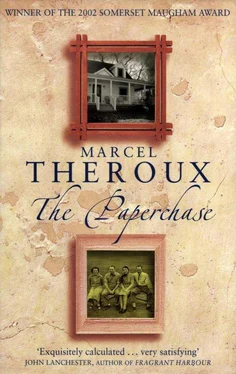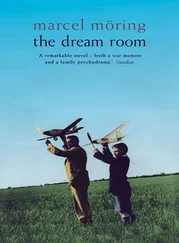If brothers can’t get on, my father once said to me and Vivian after we’d quarrelled, what hope is there for anyone? Of course, it doesn’t follow. Brothers — sisters I’m not qualified to speak about — are brought up to want the same things. Hence the emulousness, hence the contention.
And who was Dad to preach? For the last twenty years of Patrick’s life, he and my father did not speak. My father claimed it was Patrick’s fault. Patrick claimed it was my father’s fault. Who knew? I never got to the bottom of it, and I felt that to attribute blame to one side or the other just perpetuated the split. In any case, it seemed obvious that a quarrel as permanent as theirs didn’t arise from a single cause, any more than a man banging in a tent peg over a seismic fault causes an earthquake.
*
I got a clean towel from the house and walked across the marsh and down the powdery sand dunes to the beach. I was finally glad for not being in London. The sea was as clear and green as it had been that day in May. Another month of sun had warmed it slightly, but when I jumped off the jetty, the cold water squeezed my skull like a metal band. After a few moments it eased a little, and I struck out, swimming over a patch of long seaweed, like a stand of pine trees under water. I turned on my back and the sea closed over my ears. I wondered if this was what it might be like to be deaf: was it silence, or the close gurglings of your own blood, or some other sound which, never having heard another, you could never put a name to?
Even on a still day, the sound of the sea was everywhere on Ionia, but the Fernshaws and the other deaf Ionians dwelled in a place where sound was absent. Their island was a place of light and movement: the quick glittering of the ocean, the changing clouds, the vast blue sky. Perhaps their pleasure in these was all the greater as a kind of compensation. I thought of the surprising grace of Mrs Fernshaw’s pointing fingers, and the fluidity that seemed out of keeping with her age and size.
The battery would take about twelve hours to charge, which was too long to wait for a cup of coffee, so I dug out an old bicycle which had not much wrong with it apart from flat tyres and brakes that rubbed slightly. I managed to get it more or less roadworthy and then set off for the Colonial Market.
Once I had started cycling, I had a moment of enthusiasm for my new home. The sun was right overhead, and I could smell the tarmac baking in the heat. Butterflies winked their colours at me from the long grass by the side of the road. By the junction of the main road to Westwich, where a bridge forded the creek that drained the marshes, a child had set up an iced-tea and lemonade stall with a hand-lettered sign. I was encouraged to stop by the thought that Patrick would have stopped: he unfailingly supported children who sold lemonade, yard sales and anyone selling vegetables from a shack with a sign saying, ‘Home-grown produce’.
The hub of the bicycle ticked as I rode one of the pedals to a standstill. I saw that the boy was Mrs Fernshaw’s son, Nathan. Boxes of saltwater taffy were stacked under the table to stop them melting in the heat.
‘How’s business?’ I asked him.
‘I only just got here,’ he said.
After the turnoff to Patrick’s, the road we were on continued along the edge of the island to the War Bonnet Cliffs — supposedly named by the first English settlers after the headgear of the indigenous people they displaced from the island. Patrick used to say that the original inhabitants of Ionia were a pacific, agrarian people whom the English had softened up with whisky and imported diseases and then bilked out of their land. I doubt this story, and not just for patriotic reasons. The settlers were Puritans and more likely to hand out Bibles than firewater. But it is true that the War Bonnet Cliffs got their name long after the last full-blooded Ionian Indian had succumbed to cirrhosis — or old age — on the mainland. The cliffs were the island’s most famous beauty spot, and the farthest point from the dock at Westwich.
I’d only been to the cliffs once, and I remembered them as a big disappointment. My father had insisted on cycling the entire forty-mile round-trip on rented three-speed bicycles. I was twelve. We barely had time to down a soft drink before turning the bikes around and pedalling back. Patrick had wisely refused to contemplate the outing.
The cliffs had been much less garishly coloured than they were in the souvenir photographs. In fact, the high point of the day was the incredulous reaction of the man in the rental shop when we got back to Westwich and told him where we’d been: ‘War Bonnet? On bikes?’
Visitors to War Bonnet went on rented scooters and in air-conditioned buses like the one that was now pulling up on the verge and discharging a gaggle of tourists.
They streamed past me towards Nathan Fernshaw’s stand, snapping his photo and buying up boxes of saltwater taffy as fast as he could stack them on the table. It struck me that his resemblance to a child in a Norman Rockwell painting was not accidental, but shrewd marketing. Somehow, Nathan had grasped that he was really a vendor of nostalgia, as bogus in his way as the people at Plimoth Plantation who wore buckled shoes, churned butter, and pretended to talk in Elizabethan English. It was a reminder of another anomaly: while Ionia and the Cape were my New World, for many Americans they had more in common with the Old.
The driver was last off the bus. He gave the boy a wink. ‘Hiya, Nathan. How’s your mother.’
‘She’s good.’
‘Let me have some of that tea.’
The road which had been empty a moment ago was alive with people. The driver stood apart from them, slurping his iced tea from a polystyrene cup. He was in his forties, florid-faced, with a crew cut that looked like it came out of an old L. L. Bean catalogue. He saw me looking at him. ‘How you doing,’ he said, without giving it the intonation of a question.
‘I’m Nathan’s neighbour,’ I said.
‘Oh — you’re the English guy from the Captain’s house.’
I must have looked surprised because he threw his head back and laughed. ‘You know what island people are like.’ He made a gossiping beak with his thumb and forefinger.
‘I only arrived yesterday.’
‘Here for the summer?’
‘We’ll see. I may stay through the fall.’
‘Oh, fall’s beautiful here. Well, I’d better round up my people.’
When I cycled back that way an hour later the road was empty again. The midday sun was beginning to bear down on the island, wringing a little heat haze out of its seams, like whey from cheese.
Nathan Fernshaw was packing up his things, moving slowly in the heat. He didn’t look up. The tsk-tsk-tsk sound of the headphones he was wearing seemed to follow me along the road for more than a quarter of a mile. I kept hearing the same noise at intervals for the rest of the afternoon, which puzzled me, until I realized it was the whine of insects from the marsh.
TIME PASSED SLOWLY on Ionia. Without the incident of office life and the distractions of other people, the days seemed empty. I didn’t exactly miss my job, but I realised that it had been my strongest connection to the world. Even when I had hated it, it had given me a feeling of being involved in a flux of events — wars, peace talks, elections, natural disasters — that I took to be the life of the planet. Following them, if only remotely, from the newsroom had been a way of navigating through time: it gave a form to something that was otherwise infinite and blank. For a while in Ionia I felt as though I’d fallen off the map.
I made myself as busy as I could. I set myself the task of painting a series of views from the widow’s walk — one in each direction — and I bought paints at an art supply shop in Westwich as soon as I could get the car to start. My first attempts were poor but I told myself not to worry; the gift shops on Ionia were full of bad local art. And the weather was good for seven days straight from the moment I set up the easel. I wore long sleeves and a sun hat to protect myself and took a pitcher of iced tea up to the roof. As I painted each morning, I could hear the ice cubes cracking in the jug, and the smell of the acrylic paint grew more intense as it warmed up in the sunshine.
Читать дальше












